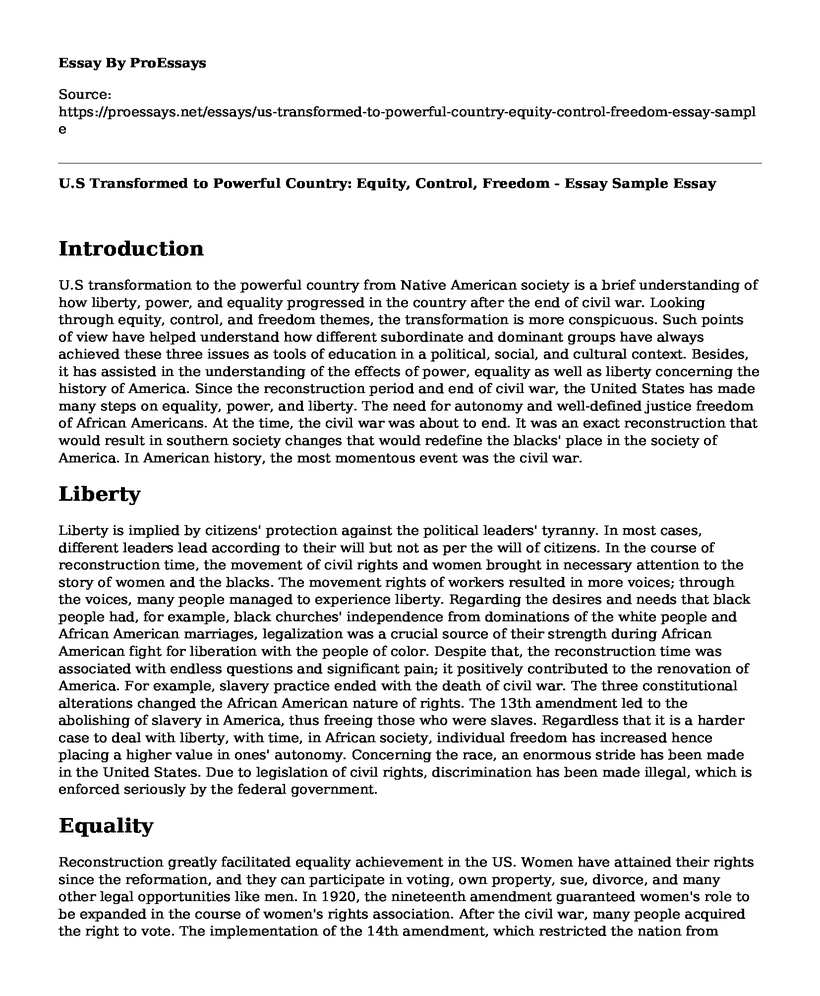Introduction
U.S transformation to the powerful country from Native American society is a brief understanding of how liberty, power, and equality progressed in the country after the end of civil war. Looking through equity, control, and freedom themes, the transformation is more conspicuous. Such points of view have helped understand how different subordinate and dominant groups have always achieved these three issues as tools of education in a political, social, and cultural context. Besides, it has assisted in the understanding of the effects of power, equality as well as liberty concerning the history of America. Since the reconstruction period and end of civil war, the United States has made many steps on equality, power, and liberty. The need for autonomy and well-defined justice freedom of African Americans. At the time, the civil war was about to end. It was an exact reconstruction that would result in southern society changes that would redefine the blacks' place in the society of America. In American history, the most momentous event was the civil war.
Liberty
Liberty is implied by citizens' protection against the political leaders' tyranny. In most cases, different leaders lead according to their will but not as per the will of citizens. In the course of reconstruction time, the movement of civil rights and women brought in necessary attention to the story of women and the blacks. The movement rights of workers resulted in more voices; through the voices, many people managed to experience liberty. Regarding the desires and needs that black people had, for example, black churches' independence from dominations of the white people and African American marriages, legalization was a crucial source of their strength during African American fight for liberation with the people of color. Despite that, the reconstruction time was associated with endless questions and significant pain; it positively contributed to the renovation of America. For example, slavery practice ended with the death of civil war. The three constitutional alterations changed the African American nature of rights. The 13th amendment led to the abolishing of slavery in America, thus freeing those who were slaves. Regardless that it is a harder case to deal with liberty, with time, in African society, individual freedom has increased hence placing a higher value in ones' autonomy. Concerning the race, an enormous stride has been made in the United States. Due to legislation of civil rights, discrimination has been made illegal, which is enforced seriously by the federal government.
Equality
Reconstruction greatly facilitated equality achievement in the US. Women have attained their rights since the reformation, and they can participate in voting, own property, sue, divorce, and many other legal opportunities like men. In 1920, the nineteenth amendment guaranteed women's role to be expanded in the course of women's rights association. After the civil war, many people acquired the right to vote. The implementation of the 14th amendment, which restricted the nation from preventing male citizen equivalent protection rights under the law, notwithstanding the ethnic group, enabled all citizens living in America to be treated fairly. However, the 15th amendment gave the black American males the right to vote. All these initiatives were constructive ways of racial fairness. Progress injustices were noted where the African Americans were not to be abused by whites in public, and they have recommendable access to employment and more nice opportunities than the past. Minority groups such as African American women are currently protected from all types of discrimination according to gender or ethnic group.
Power
Significant progress has been achieved in power distribution. Voters were granted extra voting power after approval of the 1913 direct election of the senator. This progressive policy leads to recalls and referendums, which allowed additional significant voter initiatives to be added in the ballot in case the parliamentarian fails to act hastily. However, there is increased power distribution progress; the procedure has not been forthright. Since reconstruction, the vast distribution of power growth is essential, as many Americans can experience greater social inclusion and political enrichment.
Conclusion
Even if the extension of African American equality began as a result of civil war, the amendments of the constitution, that is 13th, 14th, and 15th as well led to the provision of more straight forward accomplishment. People of races, color, beliefs, and creeds, currently continue their struggle to ensure that America, a nation of equality to all people. Therefore, reconstruction has remained to be an inspiration source among the black community as well as the women, and it is still in the minds of people. Even though there are many changes to be made, America is in a position to manage a massive deal concerning equality, power, and liberty. Many achievements on civil rights were made with the inclusion of gay movement right for both lesbian and gay couples. Although no complete equity and free society, in the United States, for example, because of whites holding many positions of power in government and businesses, it is possible to notice the progress to equal and free society.
Cite this page
U.S Transformed to Powerful Country: Equity, Control, Freedom - Essay Sample. (2023, Aug 28). Retrieved from https://proessays.net/essays/us-transformed-to-powerful-country-equity-control-freedom-essay-sample
If you are the original author of this essay and no longer wish to have it published on the ProEssays website, please click below to request its removal:
- Annotated Bibliograpy on China's Social Policy
- Why Is Racial Inequality Still an Problem in America?
- Essay on Youth Cultural Changes Between 1940's and 1970's
- The Visible Hand - Literary Analysis Essay
- Sigurd Olson and John Muir Essay Example
- Essay Example on Immigration in the US: From Reconstruction to Modern Times
- Essay on Hitler's Appointment: The Dawn of Non-Democratic Rule in Germany







